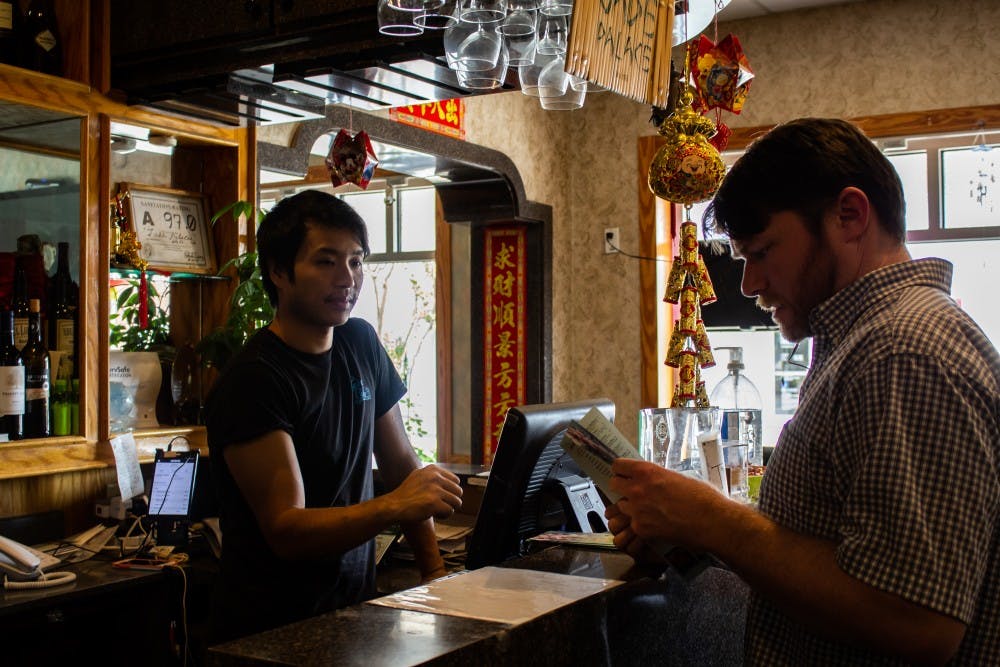“These classy living styles in America are nice, but they felt distant,” he said.
The hardest part of Wang’s new experience, however, was speaking the language.
“After a day of work, I watched television and listened to the broadcast,” he said. “I slowly learned the vocabulary. It was hard to talk to the customers, but all the words you used were related to the food and restaurant. If you work in the kitchen, you are not even in contact with the outside world.”
Wang said his daily life revolved around working at the restaurant, and he sometimes didn't know what to do with the spare time he did have. Every day, cooks and servers come into the restaurant knowing their daily tasks will be the same, he said.
"After you work in this business for a long time, you shut your eyes and feel numb," he said.
Opening the restaurants
After Yu received his college degree, he worked as an electrical engineer in California.
When he moved to North Carolina in 2010, he couldn’t find a similar job. Later that year, he decided to buy the then-on-sale business of Gourmet Kingdom.
Yu said he wanted his restaurant to be known for its genuine, Szechuanese flavor. He said the restaurant was lucky non-Chinese American customers are open to their food, but he hopes that more people try their specialties.
“Americans are willing to eat here, but they have different reactions to the food. They may swerve from Szechuanese cuisine like spicy food, cold dishes and fresh fish,” he said. “But the essence of our menu lies among those.”
Francis Chan, Wang’s uncle, handed down Jade Palace to him after owning it for 26 years. Wang said his family members all dreamed to open a restaurant.
When that dream became reality, they started with Americanized Chinese food. They gradually added more diversity in the flavor of the dishes by including Szechuanese and Cantonese styles.
To get the day's news and headlines in your inbox each morning, sign up for our email newsletters.
At that time, Wang was already familiar with the Chinese restaurant business. Since he was 17 years old, he has been working in the industry in states such as New York, Florida and New Jersey.
Next year will mark the first decade of Yu's ownership. But sometimes he misses his old work.
“Sometimes I do miss doing engineering work,” he said. “You only need to complete your project for other people, not worrying about profits.”
When he started to run his own restaurant, he realized the pressure is constant. It didn’t leave him like it did at the end of a circuit design project. Never-ending machine breakdown, bursting pipes and leaking roofs in hurricane season are all issues that could hurt profits, and constantly remain on Yu's mind.
“You are like, ‘Oh, I’m free, I’m the boss now,’” he said. “But even during vacation, your mind is not free, and your family can tell your heart is not there with them."
His family, especially his two then-teenage children, didn’t always like it either.
“They know daddy comes home late and smells like the restaurant, from clothes to shoes," he said. "They didn’t like the difficult part, but they knew it was better than unemployment.”
Wang said he knew his choices were limited as a first-generation immigrant.
“What else can I do? What else can we do?” he said. “People like me don’t have enough certificates of education. We can only work in Chinese restaurants. But it’s not bad, someone will have to do these jobs.”
Beibei Du, a UNC junior, took "HNRS 353: What is Chinese Food?" in spring 2019, where the class created an oral history project about the people and cuisine in the state’s Chinese restaurants.
One of her major takeaways from the course was the trade-off first-generation immigrants and restaurant owners face when they try to balance culture and authenticity of food.
“They probably don’t have much time and effort to spread Chinese culture while making a living out of it,” she said. “But for second-generation owners, they built a life here, and it is their living space. And now it is time for them to trace back to their cultural roots.”
Am I American?
Wang became a U.S. citizen in 2017, and he hasn’t returned to China for 20 years.
“In our village, everybody’s dream was to go abroad,” he said.
He lived in Changle, now a district of Fuzhou, the capital city of Fujian Province. His parents, like other ones in the neighborhood, have regretted letting their kids leave China.
“My mom said, ‘one generation away, one generation less,’” he said. “She knows my kids will never go back.”
When he moved to the U.S., he left behind friends and family. He said there used to be "a hole in his heart," and this wasn't filled until his family settled in the U.S.
“Now you just don’t get that upset anymore,” Yu said. “Because you feel like everything in America is so convenient and sufficient for you.”
He said the sufficiency changed him.
“After you work for a few years, you buy a house and choose so much furniture for it,” he said. “Those things satisfy you easily, in this society. And when you benefit from materialism, will you care less about your country and the things you left behind? I think, for a human being, it’s a natural transition."
@CrystalYu_
city@dailytarheel.com



